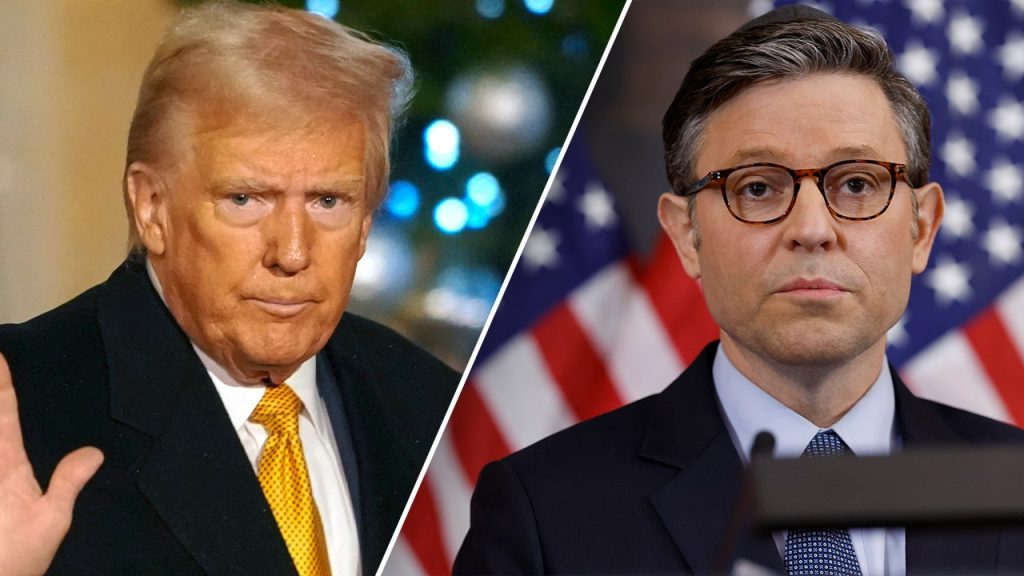The looming government shutdown deadline hangs heavy over Capitol Hill, a crisis precipitated by a confluence of factors, including a conservative revolt within the Republican Party and the unexpected intervention of prominent figures like former President Donald Trump, Vice President-elect J.D. Vance, and Elon Musk. House Speaker Mike Johnson finds himself navigating a treacherous political landscape, desperately seeking a solution to avert the shutdown scheduled for 12:01 a.m. ET on Saturday. The situation has been exacerbated by Trump’s demand to address the debt ceiling as part of the current spending bill negotiations, a move that has thrown a wrench into the already fragile process. The Republican Party is fractured, with many conservatives staunchly opposing any increase in the debt ceiling, while Democrats feel betrayed by the Republicans’ backtracking on a previously agreed-upon deal. Time is rapidly dwindling, and the likelihood of a shutdown grows increasingly probable with each passing hour.
The current impasse marks a significant departure from the dynamics earlier this Congress, where Democrats repeatedly rescued the Republican majority on crucial fiscal legislation. However, their patience appears to have worn thin, leaving Republicans scrambling for a viable Plan B. The unexpected intervention of Trump, Musk, and Vance has further fueled conservative discontent with the proposed spending bill, creating an almost insurmountable obstacle for House GOP leaders. Their influence has energized the conservative base, further solidifying their opposition to the current spending package and complicating efforts to reach a compromise. This sudden shift in the political landscape has left many Republicans feeling blindsided and scrambling to adapt to the changing dynamics.
The House GOP leadership is now grappling with the challenge of finding an alternative solution that can garner enough support to avert a shutdown. However, with time running out, the prospects of crafting a new bill and navigating the legislative process within the limited timeframe appear increasingly bleak. Adding to the complexity is the demand from conservatives that any new bill be subject to a three-day review period before a vote, a requirement that further restricts the already limited time available. Even if the House manages to pass a revised bill, its fate in the Senate remains uncertain, adding another layer of complexity to the already precarious situation.
The potential for a government shutdown, possibly extending through the Christmas holiday, has become a stark reality for many members of Congress. Numerous lawmakers expressed resignation to the possibility of a shutdown, acknowledging the difficulty of finding a combination of votes that can unlock the current deadlock. The political landscape remains deeply polarized, with seemingly irreconcilable positions on key issues. The lack of consensus and the dwindling time frame create a perfect storm, increasing the likelihood of a prolonged shutdown with potentially significant consequences.
Adding to the legislative logjam is the unresolved issue of disaster aid. Certain conservatives are resisting providing aid to North Carolina and Florida without corresponding budget offsets, further complicating the negotiations. The much-needed assistance for the aftermath of Hurricanes Helene and Milton now hangs precariously in the balance, highlighting the collateral damage of the political impasse. The failure to address this critical need underscores the far-reaching consequences of the current dysfunction and the urgency of finding a resolution.
The intricate interplay of political maneuvering, ideological differences, and the looming deadline paints a grim picture for the immediate future. The involvement of high-profile figures like Trump, Vance, and Musk has further muddied the waters, injecting an element of unpredictability into the already complex negotiations. The possibility of a government shutdown, with its potential ramifications for federal employees, government services, and the broader economy, looms large. The path forward remains uncertain, with the potential for a protracted period of political gridlock and its attendant consequences.

